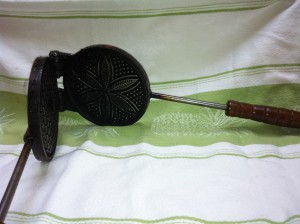The informant was born in Pennsylvania but her parents immigrated to America from Italy. Despite living in America, my informant has very close ties to her Italian roots, and still cooks many traditional Italian dishes.
The informant has been making traditional Italian waffle cookies, or Pizzelles, for as long as I can remember. I asked her to teach me how to make them this month which removes them somewhat from their normal context. Usually, pizzelles are a holiday treat and my informant makes them only for Christmas. She learned to make these waffle cookies from her mother and they used a special waffle iron that her mother brought over from Italy. What’s really special about this tradition now is that my informant still uses that same waffle iron from Italy to bake these holiday treats. No one else in the family makes pizzelles, but my informant revealed that next Christmas, her daughter will have to take over because it’s getting too hard for her to make them (she’s 91 after all). This means that her daughter will become the active bearer of this tradition and the waffle iron from Italy will be passed into her possession. Eventually, it will make its way down through the family. Below, I have transcribed the interview with my informant that took place while we were cooking.
Me: So your mom taught you to make these?
Informant: Yes. We used to make them together was I was little. But when I got married and had kids, I took over the baking.
Me: And this is the same waffle iron she used to use? In Italy?
Informant: The very same.
Me: Why do you still make them? What’s so important about them?
Informant: It’s a Christmas tradition. It wouldn’t be Christmas without waffle cookies!
Me: But don’t you get tired?
Informant: Yes, it’s hard work making 96 dozen cookies one at a time. Eventually Terry (her daughter) will have to take over. Probably next year. She can have this waffle iron too.
Me: So is it just habit to make these Christmas cookies, or does it mean something more to you?
Informant: Well, the habit is the significant part. It’s a tradition that’s always been a part of my life. It’s always been a part of the rest of the family’s too. Isn’t that enough of a reason to keep making them?
Me: Yeah, but does it like help you feel more Italian or something?
Informant: You could say that. We’re keeping an Italian tradition alive by making cookies every year. It makes me remember my parents, my childhood, even my own kids’ childhood—how I would help my mother, and then later, when Terry would help me.
Me: So that’s why you go through all this trouble every year, making tons of these waffle cookies?
Informant: It’s not trouble…I like making the cookies, I’m just getting older is all. It makes me feel connected to the past, to my parents that died a long, long time ago. And because I know that Terry will keep making these cookies, I feel connected to a future I probably won’t get to experience.
I always understood this baking tradition as a way of connecting to the family’s Italian roots. My informant sees it that way too, but she also thinks of it in a way I never would have considered. She knows that the tradition will last into the future, carried on by her daughter, then probably her daughter’s daughter, and so on, which connects my informant not only to the past, but the present and future as well. Perhaps this is why the women in the family make these cookies: to connect to past, cultural roots but also to those of the future.
Recipe:
½ cup shortening
2/3 cup sugar
3 eggs
13/4 cups flour
1 tsp. baking powder
1 tsp. vanilla
Pinch of salt
Mix shortening, sugar, and eggs. Beat until blended and smooth. Add flour, baking powder, and vanilla a little at a time mixing well. The texture should be soft but should not run. The more flour, the thicker the pizzelle will be. Other flavors may be substituted for the vanilla such as: anise seed or oil, lemon juice or grated rind, cocoa, orange juice, chopped nuts (very fine).

Annotation:
A very similar recipe can be found in 1000 Italian Recipes by Michele Scicolone. Unlike my informant’s recipe, this one does not use shortening and adds butter to the cookie mix.
Scicolone, Michele. 1000 Italian Recipes. Hoboken, N.J.: John Wiley and Sons, 2004.

